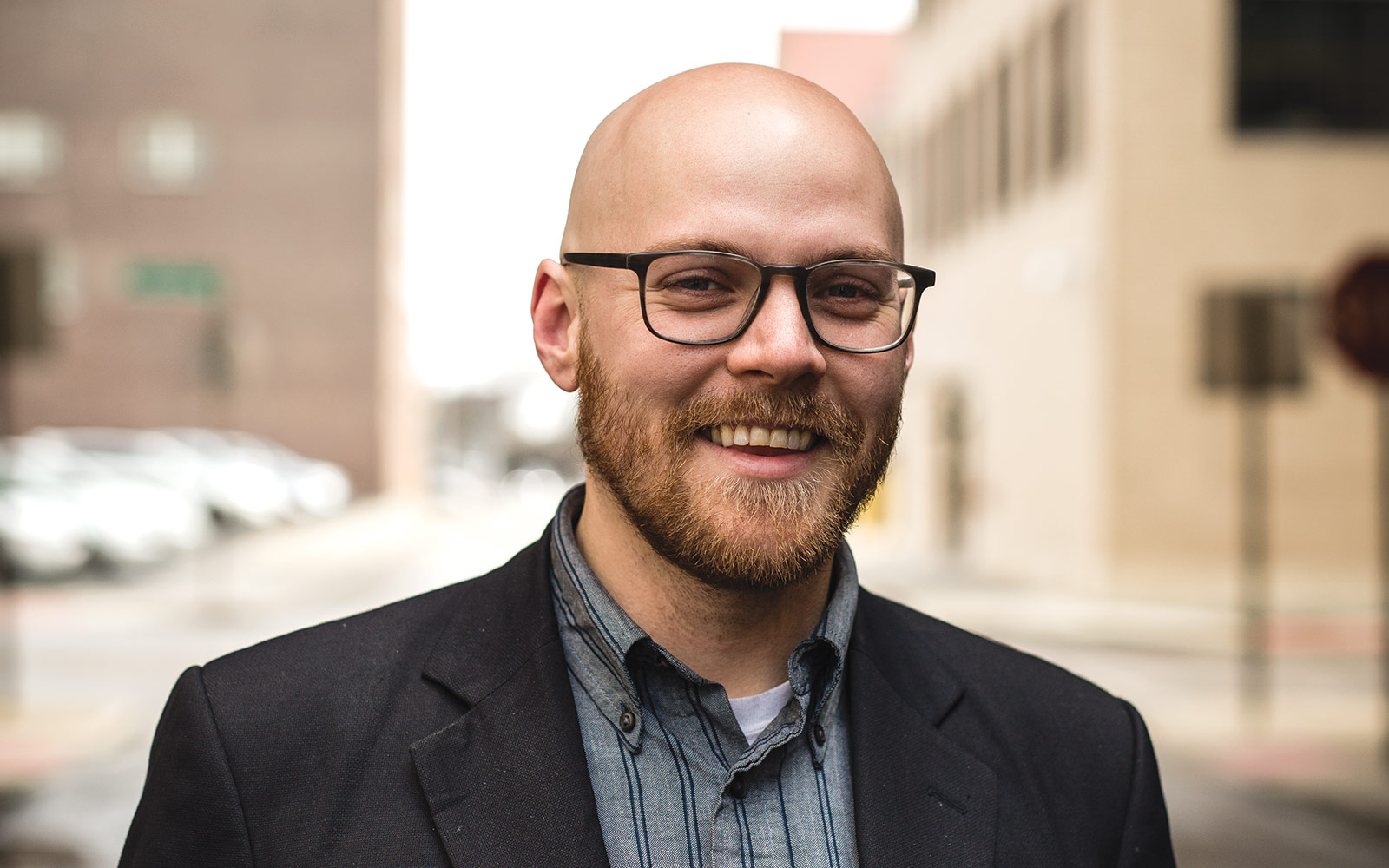Rob Moore ¡¯12 wants you to be HAPPY.
Moore, who holds an MPP from the University of California at Berkeley, runs Scioto Analysis, a public policy analysis firm in Columbus. And he is especially keen on figuring out how public policy can help us all lead happier, more fulfilling lives.
To that end, he recently joined the board of Gross National Happiness USA (GNHUSA), a nonprofit organization dedicated to increasing personal happiness and collective well-being.
Much of the group¡¯s work involves promoting alternative methods of measuring progress and success¡ªmethods that go beyond standard economic metrics like gross domestic product (GDP)¡ªto unpack the factors that affect our individual and communal welfare.
In November, Scioto Analysis and GNHUSA published a report that analyzed Ohio¡¯s recovery from the 2008 recession using the Genuine Progress Indicator (GPI). The latter includes traditional economic measures, such as personal consumption, as well as social and environmental ones, like the value of higher education and the costs of crime and pollution. Moore hopes the report will spark a broader conversation about happiness and economic growth in Ohio and elsewhere.
Here he talks about the burgeoning field of happiness research¡ªand how public policy can boost our sense of well-being.
Happiness researchers seem to measure all kinds of things, from economic growth and income inequality to people¡¯s subjective feelings about how their lives are going. Are some of these methods better than others?
I don¡¯t see these approaches in competition with each other, so much as I see measurement and thoughtfulness in competition with ignorance.
Have you heard the parable of the blind man and the elephant?
Sure. A group of blind men touch different parts of an elephant and come up with very different ideas of what the animal looks like.
I think that describes why we have different approaches.
There¡¯s no silver bullet when it comes to finding the key to happiness. And things like GDP, GPI, measures of poverty, measures of inequality, and subjective well-being all give us a tunnel-vision perspective of what makes good public policy.
If we bring all of them together, we can get a fuzzy outline of what really good public policy would be. But you have to marry all of these different approaches. When you use different measurements of social well-being, it gives you a better idea of what kinds of policies are going to help all people in society.

The Genuine Progress Indicator, which you used in your report on Ohio¡¯s recovery from the Great Recession, focuses on economics. The Gallup-Sharecare Well-Being Index, meanwhile, asks people across the country how they feel about their lives and gives a lot of weight to factors like health and sense of purpose. Do these tools really measure happiness or something else?
A lot of people who study happiness use the phrase ¡°subjective well-being¡± instead because it¡¯s a little more accurate. When they ask questions about subjective well-being, the key performance indicator is, ¡°How would you rate your life satisfaction on a scale from 1 to 10?¡± Not necessarily happiness, but life satisfaction.
As a philosophy major, I read Aristotle, and he has this concept called eudaimonia that has traditionally been translated as ¡°happiness,¡± but which some have translated more recently as ¡°flourishing.¡± That may be the more apt term for what happiness researchers are trying to get at.
So I don¡¯t think happiness is the end all be all. I think it¡¯s one piece of the puzzle. But it¡¯s not a piece you want to ignore. And if we can address poverty, inequality, human capabilities, and economic growth in the right way, that should allow people to live the kinds of lives that they want to live.
So what makes people happy, and how can public policy make them happier?
That¡¯s the million-dollar question. And I think that¡¯s the question of all social science research: How do you improve people¡¯s lives?
We don¡¯t have a ton of data right now on people¡¯s self-assessed well-being and what the impacts of public policy interventions are on that. And it¡¯s going to take a while before we really get there.
Hopefully, organizations like Gross National Happiness will promote more of these measures of happiness and will get more of that data. We are still a long way away from being able to apply it. But in general, I think that the state should be interested in trying to maximize people¡¯s happiness. Shouldn¡¯t that be an object of public policy¡ªto help people live better lives?
¡°If we have high levels of inequality in a society, then eventually people are going to become restless, and wealth is going to be taken forcibly from the people who have it.¡±
What do we know so far about how that might work?
There¡¯s a lot of public-health research that indicates that if you have more social connections¡ªif you have more close friends, if you¡¯re married, etc.¡ªit increases your subjective well-being.
But that doesn¡¯t help much from a public policy perspective. We don¡¯t really have great interventions to reduce loneliness, and governments have not traditionally been good at getting people to be friends with each other.
Are there other factors that might be easier to influence?
Research shows that we can increase subjective well-being by increasing people¡¯s incomes. And there seems to be some evidence that employment is also correlated with subjective well-being, so having a job gives you better life satisfaction.
There are some levers we can use to increase employment and income: There are tax incentive programs that can increase employment. Investment in early childhood leads to better employment outcomes. And Fahdel Kaboub, an associate professor of economics at ±Ø²©ÓéÀÖ,±È²©ÓéÀÖÍøÖ· #########, has done some fantastic work on a federal job guarantee.
But it¡¯s early days. Happiness is the next frontier in public policy research: We¡¯re trying to figure out how to use these measures and what they tell us as far as public policy goes.
So what are the next steps?
We need to create generally accepted measures of subjective well-being and do a lot of surveying across the country. Once we have that, we can start using quasi-experimental methods. Say Ohio raises the minimum wage and Kentucky doesn¡¯t. We could look at Cincinnati versus Newport and see if people¡¯s happiness increases on one side of the river versus the other over time.
Even better, we could ask people about their subjective well-being when we run randomized controlled trials. For instance, the child support agencies in Franklin County and Cuyahoga County have made some changes in how they collect child support, and they¡¯ve done it randomly so that they can see what the impact is on collections.
If we really want happiness to be a part of public policy conversations, we should be taking data on people¡¯s self-assessed subjective well-being as part of those randomized controlled trials. Then we could say, ¡°Oh, this policy intervention increased, decreased, or had no effect on people¡¯s subjective well-being.¡±

In Ohio¡¯s Economy: 2009-2016, you used the Genuine Progress Indicator to demonstrate that while the state¡¯s GDP has increased since the recession, so has inequality. Why is inequality harmful, and how does it stymie happiness?
First, there¡¯s a growing body of research that says that countries that have lower levels of inequality grow faster than countries that have very high levels of inequality. That¡¯s one reason to be worried about rising inequality.
Another reason is that inequality can lead to social instability. If we have high levels of inequality in a society, then eventually people are going to become restless, and wealth is going to be taken forcibly from the people who have it. That causes crime to grow, people to be harmed, and all these other things we don¡¯t like.
The third reason to dislike inequality is because it¡¯s intrinsically bad. Everyone deserves a shot, and the circumstances of our birth are arbitrary. Just because you were born a Walton doesn¡¯t mean that you deserve more wealth, and just because you were born into a poor family doesn¡¯t mean you deserve less.
Happiness researchers employ the same methods used by economists and other social scientists. There¡¯s even a whole field called ¡°happiness economics.¡± Yet in a recent blog post, you wrote that people often scoff when you talk about happiness in a public policy context.
I think people see the word ¡°happiness¡± as being frivolous. Which is kind of a sad thing to me. What¡¯s more important than trying to make sure that people are living satisfying lives?

